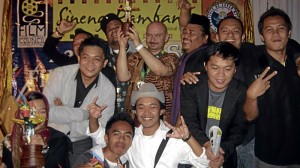
PAOLO Bertolin (center, standing, holding trophy), at the Sineng Pambansa in Marawi last year, lauds the youthful energy of Filipino filmmakers. Bayani San Diego Jr.
As the world gears up for the Cannes International Film Festival in May, a consultant for the Venice film festival visited Manila last March for his annual hunting expedition.
Paolo Bertolin told the Inquirer that he usually comes to Asia this time of the year to look for possible films he can recommend to the various festivals he works with—Venice and Udine, as well as the Vision du Réel documentary section of the Nyon fest in Switzerland.
For the Udine Far East Film Festival in Italy, ongoing till April 28, Bertolin “discovered” Antoinette Jadaone’s “Six Degrees of Separation from Lilia Cuntapay.”
(The other Filipino film in this year’s Udine is Marlon Rivera’s “Ang Babae sa Septic Tank.”)
“I’m so proud of ‘Six Degrees.’ It’s a must-see. If it were up to me, I would’ve included it in the lineup of the world’s top festivals,” Bertolin said of Jadaone’s film.
Little-known gems like “Six Degrees” affirm Bertolin’s confirmed appreciation of Philippine cinema.
Impressed by indies
“Every time I am in Manila, I am impressed by the excitement that pervades the indie film scene,” he remarked. “Here, cinema is still relevant. I am likewise struck by the youth of the producers, writers, and directors.”
Bertolin was referring not only to chronological age, but to the youthful energy of indie filmmakers.
He pointed out veteran filmmaker Mario O’Hara, who ventured into digital filmmaking with “Ang Paglilitis ni Andres Bonifacio.”
O’Hara’s work is marked by “sheer joy,” Bertolin pointed out. “You could see that he was happy to make movies again. The passion in Philippine cinema is evident. I don’t see that in other countries.”
He related that filmmakers elsewhere were jaded. He said it was often all about recognition. “But Filipino filmmakers truly want to say something important. They love cinema.”
There was no question about the diversity of film talents in the country, he said; it was more of having a systematic way of finding them.
He lauded the institutional support given by digital festivals like Cinemalaya, Cinema One and Cinemanila, but wondered how to reach directors outside the radar.
He counseled filmmakers to take charge of their projects and post information material on their films online.
Sound advice
“A simple, short synopsis, will suffice, along with the filmmakers’ contact numbers,” he said.
He would’ve wanted to meet with various Filipino filmmakers (including Erik Matti and Ray Defante Gibraltar, among others), but his three-day visit was too short.
Info kits on the latest local movies, as well as trailers, would be a big help in his research work, he said.
He plans to return in June, to serve as juror in a Davao film festival.